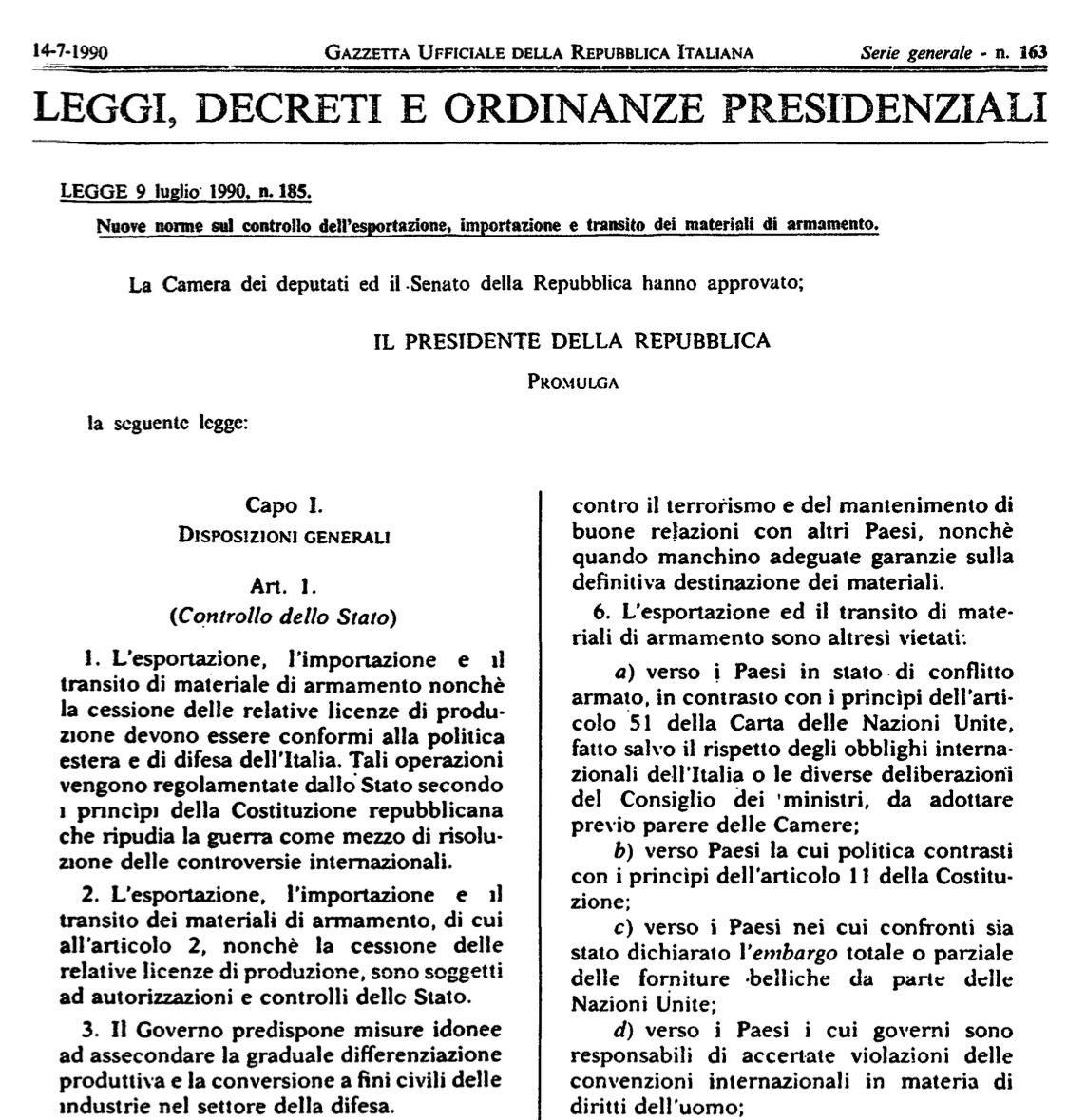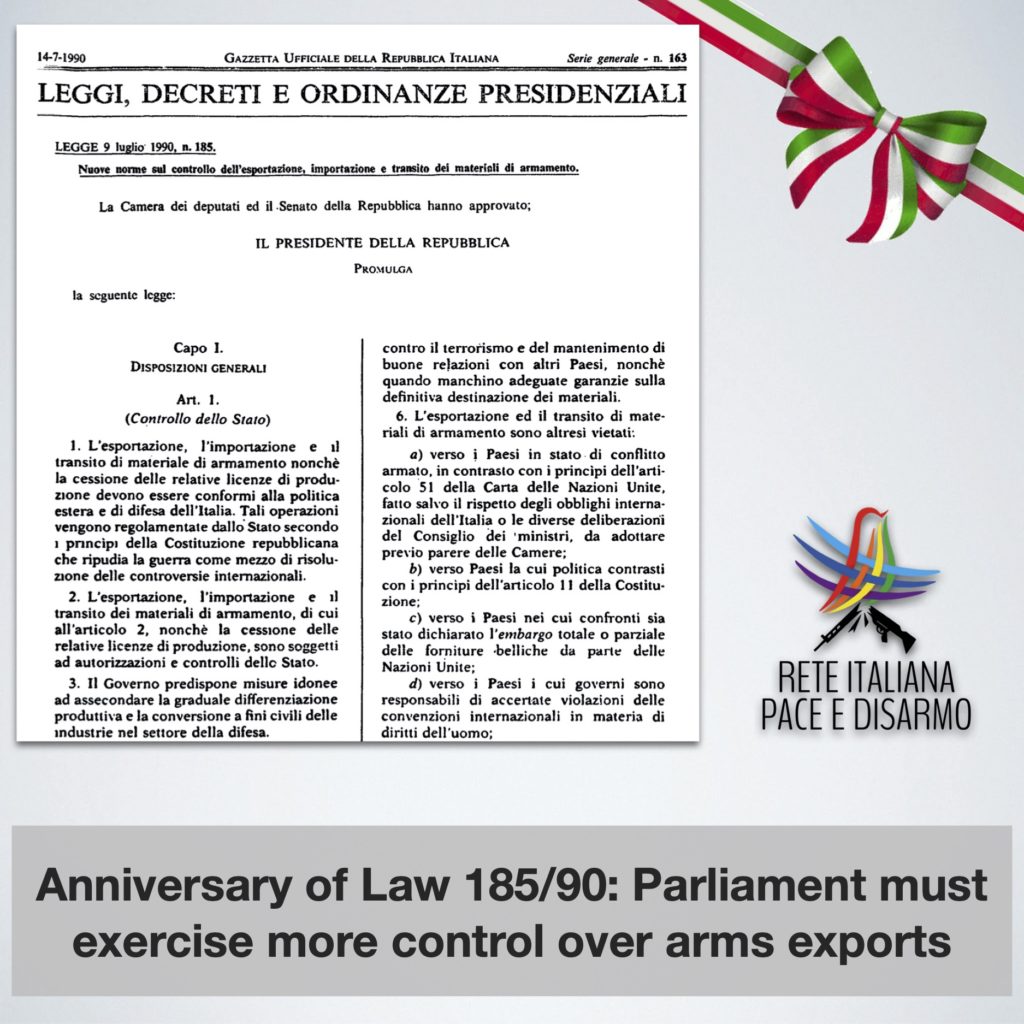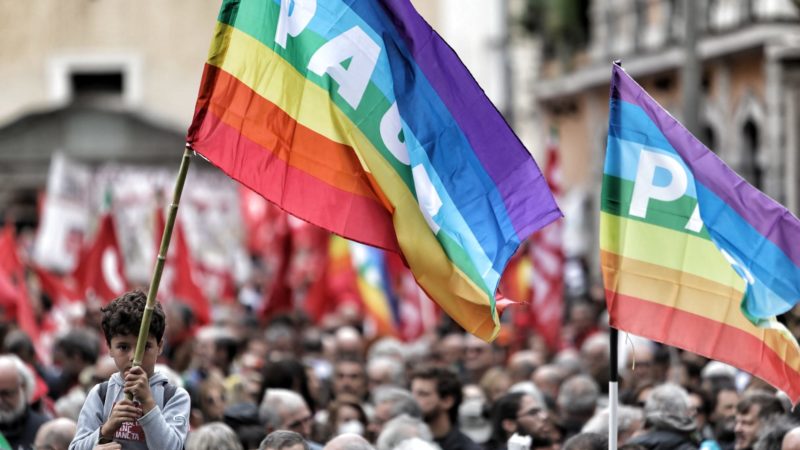Anniversary of Law 185/90: Parliament must exercise more control over arms exports

Saturday 9 July marked the 32nd anniversary of the entry into force of Law 185 of 1990 regulating Italian arms exports: an important regulation that should be given greater consideration and evaluation by Parliament.
Obtained thanks to pressure from civil society, Law 185/90 anticipated the mechanisms and criteria of international rules regulating the arms trade such as the European Union Common Position and the International Arms Transfer Treaty ATT.
Law 185/90 is based on the principle that arms sales cannot be considered a mere business but must be linked to foreign policy, respect for human rights and Italy’s role of Peace enshrined in Article 11 of the Constitution. Another important element is transparency, in particular through the Annual Report that the government must send Parliament every year with all the data on arms exports.
Thanks to this data (because arms exports are too important an aspect to be opaque, as happened in the decades of scandals before Law 185/90) civil society – in particular our Italian Peace and Disarmament Network – has been able to shed light on these dynamics, highlighting the problems with the export decisions taken by the Government, which have led the majority of Italian arms to be sold to non-EU and non-NATO countries. An important role of control is instead assigned to Parliament, but in recent legislatures the Chamber and Senate are not exercising it as they should, favouring the pressures of those who would like to give the military industry a ‘free hand’. We note with regret, for example, that when the 2022 Report was published, there was no adequate reaction from deputies and senators to the serious error in the first version of the document sent to Parliament, which was only corrected (quietly) after our network’s warnings.
For many years, the Annual Report under Law 185/90 was not even discussed in the competent parliamentary committees, despite the pressure from civil society to do so and the direct and important comparisons that used to take place on a regular basis even with the government. Only in recent years have a few parliamentary sessions been devoted to analysing the Report (in some cases hearing the Network and civil society), but in the last two years it has only been the Defence Commissions that have dealt with it.
A problematic dynamic that persists even during the current parliamentary sessions. After the presentation of the Annual Report in April 2022, in fact, only the IV Commission in the Senate began a debate, in fact preventing a similar discussion in the III Commission on Foreign Affairs, for reasons of regulation. A ‘stratagem’ that, given the composition and the political line of the Commission chaired by former Defence Minister Roberta Pinotti, in practice ensured that the debate was only unbalanced on industrial aspects and on ways to favour (not control!) arms exports. It is no coincidence that in the course of the six sittings devoted to this subject, the Senators only had the government and military industry representatives as interlocutors (with the informal hearing of Guido Crosetto, president of the Italian Federation of Aerospace, Defence and Security Companies AIAD). The result is an outline of the Report, to be voted on Tuesday 12 July, which asks the government to favour ‘Government to Government’ contracts (which favour companies by taking on a ‘political’ sales characteristic) and the role of the Ministry of Defence (to weaken the control function of the Ministry of Foreign Affairs, through UAMA).
At the moment there is no room for the proposals (re-proposed every year) of the Italian Peace and Disarmament Network with a view to strengthening control and aligning decisions with the principles and criteria of Law 185/90 and international standards which, in order to protect civilian populations and cushion the negative impacts of an irresponsible arms trade, envisage authorisation mechanisms that do not put economic returns at the first place.
Where is the check on a real alignment with the criteria of protecting Human Rights and not sending armaments to conflicts that all Italian parties have always ‘celebrated’ as a positive innovation of Law 185/90? Yet there have been many cases in which Italian arms have been sent to places of combat or where people’s rights have been violated…
Our Network has also dealt with such cases, both by achieving an increase in public awareness of control and – in the case of the bombs directed towards the conflict in Yemen – also by stopping some supplies. Initiatives and actions of active citizenship, also taken at the international level, which will be increasingly difficult if a ‘business’ vision of arms export control, in stark contrast to the rationale of Law 185/90, takes over.
On the occasion of the anniversary of this civilisation law, we call on Parliament to return to the serious business of arms exports (within a framework of overall control, not as ‘aid’ for the military industry), bringing Italy’s positive experience to international forums as well. The ATT International Arms Transfer Treaty and its criteria (forgotten, for example, in the management of flows to the conflict in Ukraine) must be strengthened and implemented in the best possible way. The Italian Peace and Disarmament Network will also be present at the next ATT States Parties Conference in Geneva at the end of August, together with the international civil society gathered in the Control Arms coalition.
The Italian Peace and Disarmament Network, its organisations and its experts and analysts therefore renew to the Chamber of Deputies and the Senate of the Republic their request (and willingness) to be heard by the competent parliamentary commissions on the subject of arms exports and Law 185/90.



